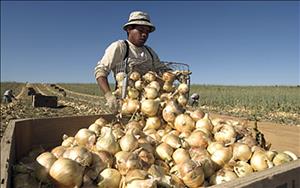On April 20, 2007, Washington Governor Christine Gregoire signs House bill No. 1556 designating Walla Walla sweet onions the state's official vegetable. Passed unanimously by the House and by a 42-3 vote in the Senate, the bill brings to fruition three years of student lobbying.
Teachers and students from Kirkland Junior High School and Eatonville Middle School who had lobbied for the bill, and farmers who grow Walla Walla sweet onions, looked on as Governor Gregoire (b. 1947) signed the bill in Olympia.
Kirkland Junior High School teacher Toni Miller and her students first proposed Walla Walla sweet onion legislation late in the 2004 legislative session, but the session ran out before both houses had approved the bill. They tried again in 2005 but the bill failed to pass both houses. During 2006 Kirkland students emailed and wrote to legislators and testified during legislative hearings, but gained a nemesis: the Washington State Potato Commission.
Food Fight
Potatoes are Washington's top-grossing vegetable. The Washington State Potato Commission is an educational and lobbying organization that serves the potato growers of Washington state. Potato Commission chairman Randy Mullen told The Seattle Times, "I don't have anything against the Walla Walla sweet onion, but if you ask me, it's a county onion, not a state onion" (February 15, 2006).
During the 2006 legislative session a Senate committee passed a so-called "bulb and tuber" amendment honoring both potatoes and Walla Walla sweet onions as state vegetables, but the bill died for lack of a vote. Local newspapers, quick to find humor in the sparring vegetables saga, harvested puns by the bushel. One story in The Seattle Times, under the headline "Veggie Rapprochement," began: "A year ago, the Washington Potato Commission tried to make hash of an endearing legislative proposal by Kirkland Junior High students ..." The bulb-tuber bill, the article continued, "never gained traction ... but all that disappointment has been plowed under" (February 4, 2007).
At the beginning of the 2007 legislative session, a group of legislators led by Representatives Maurine Walsh, R-Walla Walla and Bill Grant, D-Walla Walla reintroduced the onion bill. The Potato Commission agreed not to stand in the way of the bill's passage. "Our onions may not be as prolific as our potatoes, but they are unique," Senator Marilyn Rasmussen, D-Eatonville, told the Seattle Post Intelligencer (April 6, 2007). Senator Walsh told a House committee, "Frankly, onions and potatoes are a lovely combination" (The Seattle Times, February 4, 2007). Kirkland Junior High School teacher Toni Miller had retired in 2006. Eatonville Middle School teacher Alex Hansen and his students stepped in to lobby for the bill.
How Sweet They Are
Peter Pieri brought sweet onion seed from the island of Corsica off the west coast of Italy to Walla Walla in the late 1880s. Using selective cultivation over time Pieri and his neighboring farmers developed the larger, sweeter, rounder onion that became known as the Walla Walla Sweet. These onions were first harvested in the Walla Walla valley in 1900.
The onions are 95 percent water and must be harvested by hand. Their low percentage of pyruvic acid (the chemical that makes onions pungent) distinguishes Walla Walla sweets from their tear-inducing kin. Walla Walla sweets are grown in Washington and Oregon, harvested from early June through August, command a higher price than most other onions, and are shipped throughout the United States and Canada.
On May 24, 1995 the United States Department of Agriculture issued Marketing Order 956 designating Walla Walla sweets as a unique variety of onion and establishing an official growing region. Only onions grown within the specified area (the Walla Walla valley of Southeast Washington and Northeast Oregon) can legally be marketed as Walla Walla sweet onions.
Washington My Home, Onion My Vegetable
Walla Walla sweet onions joined an elite list of Washington's state symbols, including the Western hemlock, willow goldfinch, coast rhododendron, steelhead trout, apple, Columbian mammoth, bluebunch wheatgrass, orca whale, green darner dragonfly, and the songs "Roll On, Columbia, Roll On" and "Washington, My Home."
Georgia, Texas, and Utah have also designated sweet onions as their official state vegetables.

